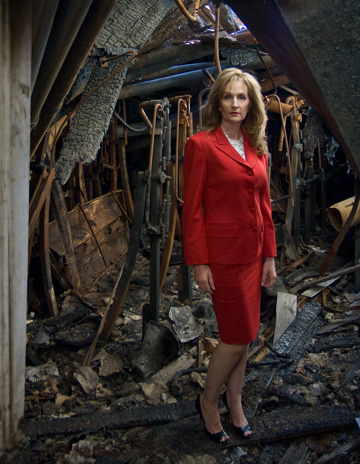On the one hand, when she was pregnant the crew at her fire station wanted to throw her a baby shower. On the other, the battalion chief, who had once called her a fat ass, nixed the party, she says. A certain amount of horsing around or “agitation” is tolerated or even encouraged in the fire service. When Lopez transferred to a new fire station in 1998, it started as harmless water fights. Then the guys started leaving her artful arrangements of vegetables in the fire station kitchen, a couple of potatoes nestled alongside a zucchini.
It deteriorated from there.
Her covers were thrown on the floor so many times that she stopped making her bed. Someone melted a lamp clear through her clock radio. The wooden bench her late father-in-law made her was smashed to pieces. Water was mixed into her vehicle’s fuel tank, damaging the engine. In March 2007, she was cleaning her personal area in the fire station when she noticed two large stains on her rug. She held it up and sniffed—urine.
Lopez complained to her superiors and eventually to internal affairs. The only thing that seemed to get their attention was when she went through her time cards and showed them that she went from driving the engine about half the time to less than 1 percent of the time after a new lieutenant came on. Eventually Lopez began spending much of her time alone in the firehouse, reading.
“We can be friends, but we’re never going to be bubba,” she says. Even then, she refused to quit. “It’s like being a battered wife. You love the job, you love what you do, and no matter what happens, no matter how bad it gets, you’re not going.”
In September 2008, she filed her workforce complaint, alleging that the fire department promoted its black employees but unfairly treated females in everything from pay to promotions. “I became the troublemaker,” Lopez says, covering her ears and eyes, because down at the fire stations, it’s see no evil, hear no evil. “I’m not a big women’s libber,” she adds in her Southern drawl. “I just wanted to be treated fairly. You think those people care who pulls them out of the fire, whether it’s a man or a woman?”
And, finally, there is the case of Cheryl Hill. She was an accounts payable worker in the warehouse area and had worked for the City of Dallas for 17 years. Hill says she looked into her coffee cup in March 2008 and realized what the white substance was that had been splattered in her office once before. She ran to the bathroom and vomited, and then she brought her coffee cup to her manager. “Look what’s in my cup,” she said. Testing later confirmed it was semen.
Hill asked her manager to change the locks on her office door, and he did. But he didn’t think the matter important enough to report to internal affairs—or even to have her office cleaned, she says. Hill had to get out the paper towels and soap and scrub the semen off her own keyboard.
Hill’s husband sent her to the doctor with the cup in a plastic bag, and the doctor sent Hill to the police. The police handed her back to the fire department without opening a criminal investigation, though the incident should have been treated as an assault, says Hill’s attorney, Aaron Ramirez. For the next four months, while the fire department interviewed everyone who worked in the warehouse, Hill wondered if a rapist or psychopath was on the loose.
Turns out it was the mechanic who used to have her office. After a stint on paid leave, he quit. Hill, who had been suffering from anxiety and nightmares, filed her workforce complaint this May and retired the next month. They don’t care about the victim, Hill says. “They just want to keep you quiet.”
Even when the department pursued one highly publicized case of sexual harassment, its tendency toward secrecy proved punishing. Assistant Chief Roland Gamez was fired in 2006 after the department learned he had been massaging necks, pecking cheeks, and squeezing knees of his subordinates in the 911 call center. More than a dozen had complained, including a man who said Gamez told him he could kiss him on the lips. But Gamez sued for wrongful termination and settled the case for $1.55 million after the judge harshly rebuked the city and fire department staff for hiding and destroying records related to the case.
Mike Fetzer, district director of the Dallas EEOC office, says federal workforce commission complaints are confidential and he can’t speak about specific municipalities or agencies, but “fire departments historically have had issues. It is an area where some developments came slowly. Some have enlightened managers who just won’t tolerate harassment or discrimination, and that was true in places 20 years ago and true today. But some still don’t get it.
“In almost all of the cases, because of the intimate environment, management either knew about it or should have. And good managers do something about it,” Fetzer says. Agency leaders often have their eye on the bottom line when it comes to lawsuits, but discrimination complaints are much more costly than lawyers and settlement fees, in his estimation. Fetzer says, “The real cost to the city is the efficiency of the department and whether people want to work there.”
===Siri’s lawsuit was a must-read among the rank and file. “We’re hoping her lawsuit is going to clean house, for the chief and all his subordinates. Hell, I’ll pack his bags for him,” one firefighter says.!==
Some firefighters have started making bets on how long Chief Burns will last. But Leanne Siri fell first.
She says she asked twice to be transferred out of the fire department, in December 2008 and again the next month. Then she sent her letter of charges, marking it confidential, but city attorneys distributed the information to everyone mentioned in the letter, many of whom carry guns. “It’s a situation that is prone to retaliation. They had no regard for that or her safety,” says Amy Davis, her lawyer.
In late March, Siri and Davis met with city and fire leaders to discuss her complaints, but Siri says the city response amounted to little more than “Did you expect us to come in and hand you a $6 million check?” Only after the television news picked up the story did the city hire an independent investigator to look into her claims, she says. The city petitioned the state attorney general’s office to withhold portions of that investigator’s report from D Magazine, and the AG had not reached a decision as of press time, in late September.
Meanwhile, even as Dallas Fire-Rescue officers were arguing that Siri’s complaints were baseless, they were scrubbing the stations of every last Playboy. They built partitions to give female firefighters privacy when they slept. And “The Porn Squad” warned firefighters to rid their stations of all R-rated films that might feature nudity. Lockers, vehicles, computers—it was all inspected.
In August, John Cook, the department’s 801, or No. 2 chief, quit after a little more than a year with the department to semiretire at age 59. Cook was another outsider with stellar credentials, a published author with 40 years of experience who taught at the National Fire Academy. But Cook says he stepped down from his post prematurely because of differences of opinion with Chief Burns over the direction of the department.
“Some of our leadership is more interested in bells and whistles than basic services,” Cook says. In his view, the rift between the current administration and the rank and file has grown so wide that the department is paralyzed. “There is such a huge division that I’m not sure it can be repaired,” he says.
“I don’t think I have ever seen the morale as low as it’s been right now,” says another officer who still works for Dallas Fire-Rescue. Siri’s lawsuit was a must-read among the rank and file, another noted. “We’re hoping her lawsuit is going to clean house, for the chief and all his subordinates. Hell, I’ll pack his bags for him,” the firefighter says.
Siri thought the city might dispatch her quietly, along with the masses of other employees who were laid off in August in an attempt to balance the city’s budget. Instead, the city waited two more working days to fire her. When she was finally summoned by First Assistant City Manager Ryan Evans, he told her they had lost confidence in her ability to perform her job effectively.
Siri had long since cleared her office of personal items, including her plants and the photo of her son whose car crash had pushed her into the arms of the Dallas fire department. When the moment came, Siri had only to grab her purse and follow the two security guards who marched her through City Hall and down to the underground parking garage.
Now Siri isn’t as blonde as she used to be. She’s taking medication and seeing counselors, she says. Her court battle has just begun. Despite all she’s gone through, or perhaps because of it, she tears up when I mention the heroics of New York City firefighters on 9/11, when I saw men—and it was only soot-stained faces of men I saw—digging through the mound of smoldering rubble all night, refusing to stop the search for their brothers in uniform who had rushed into the falling towers.
Even though she’d been fired, Siri pulled herself together in late August to give a previously scheduled talk at the International Association of Fire Chiefs convention, which was held in Dallas. The title of her presentation: “Leading Women in the Fire Service.” Siri compared the fire service to a gang, a subculture with its own norms that survives on loyalty in life-or-death situations. “You’re in a family like the mafioso, where no one tattles,” she said.
As the saying goes, where there’s smoke, there’s fire. “When it comes to the fire service,” Siri says, “if you hear about a little, then you can be sure a lot is going on.”
Gretel C. Kovach is a contributing editor to D Magazine.






